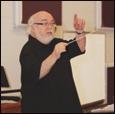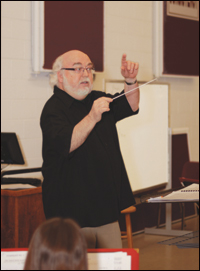 Many things have changed since we spoke with David Holsinger in 1999. He left Shady Grove Church in Grand Prairie, Texas, to join the faculty of Lee University in Cleveland, Tennessee, where he directs the Wind Ensemble and teaches advanced instrumental conducting and composition. In April 2003, Holsinger received the Distinguished Alumni Award from Central Methodist College, and the following month Paul Conn, President of Lee University, presented the composer with the university’s Excellence in Scholarship faculty award for his continued achievement in musical composition. Over the past decade, Holsinger has been visiting composer-in-residence at eleven American colleges or universities.
Many things have changed since we spoke with David Holsinger in 1999. He left Shady Grove Church in Grand Prairie, Texas, to join the faculty of Lee University in Cleveland, Tennessee, where he directs the Wind Ensemble and teaches advanced instrumental conducting and composition. In April 2003, Holsinger received the Distinguished Alumni Award from Central Methodist College, and the following month Paul Conn, President of Lee University, presented the composer with the university’s Excellence in Scholarship faculty award for his continued achievement in musical composition. Over the past decade, Holsinger has been visiting composer-in-residence at eleven American colleges or universities.
“Admittedly, when I went to college I didn’t intend to be a music teacher. I went to college because everyone told me I should be a music teacher. Most of the other students wanted to teach music more than I did, but now that this is my profession, it has become my passion in life. My goal daily is to pour as much into my students as I can. Looking at them, I realize that one of them may replace me on the podium some day.”
What is your approach to teaching conducting?
I teach advanced instrumental conducting at Lee, following the ideas in books by Joe LaButa, Donald Hunsberger, and Anthony Maiello. In the last couple years I’ve discovered the Rudolf Laban method. Laban was a choreographer who devised a shorthand for choreography and dance analysis. Conductors have taken this method and applied eight of his movements to baton work: the flick, dab, jab, slash, wring, press, glide, and float. Of course, there is more to the method than these movements, but young conductors usually overconduct, so using these movements gives them a more restrictive vocabulary to clarify their conducting. Many conductors use too many extraneous moves, often just for the sake of moving, rather than teaching music. I think this method is well worth investigating by all conductors.
Part of my teaching is to make my conducting students realize that the ensemble is their instrument. My conducting students are very important to me because they will have responsibilities later that they can’t imagine, and I want to get them fully prepared. I’ve had several students recently who will make fine conductors. By that I don’t mean that they can conduct a good beat pattern as much as I mean that they know about music and are able to teach it well. Someday these music education majors will have to explain expression to their students.
Inexperienced conductors rarely know what they want to fix, because they don’t have specific expectations for the sound. A good conductor knows what he expects to happen and what he wants to hear, regardless of the piece. The same group can sound like two completely different bands, depending on whether the person on the podium has that inner musical expectation.
There are things that always work in music, no matter the piece. These include basic musicianship – intonation, balance, and blend. In addition to these, there will be things to discover that are specific to each piece, but much of the work will already be done if students understand that the basic attributes of musical expression apply to every composition they play.
What do you focus on in composition lessons?
I believe composition students should develop a process – order of attack – for exploring new ideas. With the immense number of melodic, harmonic, and rhythmic possibilities for every idea, they have to learn to make choices about which possibilities to use before continuing to the next idea set.
I also want students to realize that they should not limit themselves to a favored style, whether that be common practice period, pandiatonic, minimalistic, or anything else. Students can have their own voice, but they need to make logical expansions of their current boundaries.
After writing my first piece, I thought I was already a composer, when I should have pledged to be a lifetime student of composition. I have found that it is still necessary to be a student of the craft and to remember my weaknesses at age 19. I want my students to take advantage of their strengths but not overestimate their natural skillfulness.
What mistakes do young composers make?
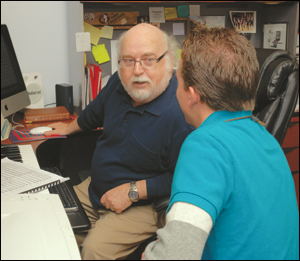 People do things because they can, not because they should. A brass player can pull out a tuning slide and tap it against his bell as part of the music, but that doesn’t make it good music.
People do things because they can, not because they should. A brass player can pull out a tuning slide and tap it against his bell as part of the music, but that doesn’t make it good music.
Some young composers are starting to add computer-generated sounds to their works. While it is easy to bring a laptop computer loaded with computer-generated sounds to a rehearsal and concert, I question whether it really adds to a piece. If students can produce similar sounds on their instruments, it would be better to write such sound effects in the students’ parts.
I work on structure quite a bit with my composition students, because it is extremely important. Schoenberg wrote many of his works in Common Practice Period forms. He wasn’t interested in changing the structural language of music, just the harmonic language.
I was on the panel for the Ostwald Composition Contest this year. One of the other panelists commented that, be it considered old-fashioned, he liked music that had structure to it, a sentiment I share. I appreciate innovative young composers but am concerned about a lack of structure in many new pieces. They tend to wander too much for me. Some conductors are more enamored by innovation than musical integrity, and as a result many premieres and final performances take place on the same night. We should take better care of our young composers.
Do composition contests help composers?
I remember a conversation about this with Dana Wilson. He had won some contests but said he didn’t get any more telephone calls after winning than he did before. For new composers, it can be a feather in their cap. I’d love to write a chamber piece that would win the Pulitzer – dreams don’t have to be logical.
I first heard about the A.B.A. Ostwald Prize in college; the band director would always tell us when a piece we were playing was an Ostwald winner. It was a big deal to him. The thrill of my winning several times was not the prize but rather the humility of being a part of the list of venerated composers I had admired for years.
I encourage extremely talented students to send something to competitions because often that encouragement gives them the impetus to work hard and go to a practice room to listen to themselves. In general, though, I don’t talk about contests much with my students; I am more concerned about getting undergraduates ready for graduate school.
What is your compositional process?
Many composers set aside a time of day when they are most apt to feel inspired, but I tend to just grab any chance I get. When an idea is there, the notes on the page come easily. That said, I need a picture to paint. I write very little absolute music but prefer to compose stories. I also need a title before beginning a piece. For weeks I knew the story line for To Tame the Perilous Skies – a composition celebrating the 50th anniversary of the Battle of Britain – but until I had the title, no note was put on the page.
How do you avoid becoming complacent or following a set style in your new works?
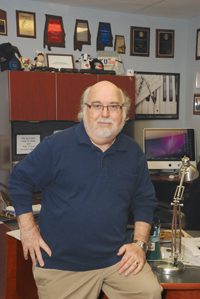 I suspect that there is a big difference between complacency and stylistic signatures. I try to write three or four different pieces a year, for which there are going to be similarities because I’m the same person each time. It’s the style of my writing that draws people to my music, similar to why we read books by authors we like – we enjoy how they write. After 40 years, I am afraid that some of my signatures are frozen in time. I couldn’t escape them if I tried.
I suspect that there is a big difference between complacency and stylistic signatures. I try to write three or four different pieces a year, for which there are going to be similarities because I’m the same person each time. It’s the style of my writing that draws people to my music, similar to why we read books by authors we like – we enjoy how they write. After 40 years, I am afraid that some of my signatures are frozen in time. I couldn’t escape them if I tried.
It sometimes seems that I am not concerned about keys, but I am. Usually I write something and then realize later that the parts will be difficult to play for some instruments. I adjust these sections to a better key; a modulation up or down a half step will not hurt anything. If the music is right, what pitch level it occurs at really doesn’t matter.
I believe that my composing style has changed since 1996. Two events – one internal and one external – have colored that change. Looking at my music before and after 1999, there has been a definite relaxation of rhythmic and contrapuntal turmoil. Around the year 2000 I had a somewhat Copland-esque transition in my thoughts about music and began to pursue a simpler course; I just began to like a different sound than what I had been writing. Perhaps some of my inner turmoil settled after writing Battle Music, which is probably the angriest piece I have written.
In 1999 I also changed jobs, going from an extremely flexible church position where I wrote music all year to a university position. It was a great move, but it changed my priorities quite a bit and whittled my writing time down to about five months out of the year. I still follow a schedule of three to four pieces a year but now write them in less than half the time.
I think it would be difficult to make a living just as a composer; in the band world, everyone who composes also conducts. This returns us to the question, shouldn’t everybody attain to being a better conductor?
When you accept a commission, do you do all the research, or do you accept ideas from the people who asked you to write?
When people commission a new work, I try to do something related to the community. Several years ago I composed a piece for the town of Shelby, Ohio, known for the Shelby bicycle and the Shelby car. Because the place has such a history of industry the piece I wrote included a lot of mechanical effects. Few people who commission a work have specific ideas, although a few years ago, I did ask one person what kind of piece he wanted and received a three-page outline, measure by measure, in return. I replied that I had just wanted to know fast or slow.
In general, people call because they like my music. When I write, if someone asks for a grade 3 piece I will push the envelope a little and write a 3 1⁄2. If someone tells me they have a weak section I take that into consideration, but I also want students to grow and feel like they’ve been somewhere when they get done with one of my works.
I tend to pass on most young band works because I do not feel that I write well for young groups. I enjoy writing grades 3, 4 and 5 music.
Which of your works are your favorites?
Since 1996 I have written 56 compositions. Of these my favorite is The Easter Symphony, a work for band and chorus on the Easter story. I wrote it over a ten-year period and have often said that if there was one piece I was supposed to write before I died, it was this one. Another favorite, also written for band and chorus, was a commission for the Air Force, The Song of Moses, five movements based on the last words of Moses.
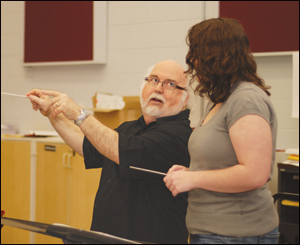 Two other favorites from the turn of the century are Battle Music, because it is mean and angry and I don’t get to be that way very often, and Scootin on Hardrock, which is an homage to all that was good about my life in Texas. I also like my Cityscapes, for which the three movements were published separately over a six-year span but are meant to be played together as a symphony.
Two other favorites from the turn of the century are Battle Music, because it is mean and angry and I don’t get to be that way very often, and Scootin on Hardrock, which is an homage to all that was good about my life in Texas. I also like my Cityscapes, for which the three movements were published separately over a six-year span but are meant to be played together as a symphony.
What was the reason for redesigning the summer camps at Lee University?
The summer music camp at Lee University is not specifically a band or chorus camp, but it is designed to give students a feel for being in college. In addition to attending band, choir, orchestra, jazz combo, or church music studies every day, students also have music theory, sight singing, ear training, music history, and numerous electives, from music-writing software to a jazz improvisation class for people who are not jazzers.
My wife, Winona, is the chairperson. Lee is a church-related school, and for years it ran a music and art camp that was basically a church camp with music. However, in the last seven years, with a new dean, we developed a camp aimed at college-prep students. The Lee University music faculty, along with some graduate students, teach in the camp, and it has become an extremely important part of the year.
I love it at Lee. It fits our family, our personalities, what we do, and who we are. There are 4,200 students enrolled here, with 275 music majors and 600 students involved in musical organizations. What more could a composer and conductor wish for?
